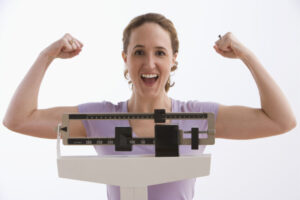Everyone experiences anxiety every now and then—it’s normal in certain situations or events, like a job interview or performing on stage. However, if you experience anxiety every day over routine things like driving your car or speaking to coworkers, you may have a generalized anxiety disorder, and it may be time to seek professional help.
Left untreated, your anxiety symptoms can become worse and lead to frequent panic attacks and other health issues. The guide below provides a detailed list of symptoms that indicate you may benefit from anxiety treatment.
If you identify with the majority of the symptoms of anxiety on the list below and are wondering when to seek help for anxiety, Klarity can help. We can connect you to licensed healthcare providers for online anxiety treatment in just 48 hours. They’ll develop a customized treatment plan to help you find relief from your chronic anxiety. Book an appointment today.
Ready for the next step in your mental health journey? Book an appointment with a licensed provider on Klarity today.
8 Signs It’s Time To Seek Professional Help
Some individuals go months or years managing clinical anxiety on their own—however, if you notice certain signs, including physical and psychological symptoms, it may be time to seek professional assistance. One common indicator that you may need professional help is worsening symptoms, especially if they begin to interfere with your daily life.
Below is a detailed list of other common signs that indicate you need to seek professional help to manage your anxiety disorder.
1. A Decline in Physical Health
Chronic anxiety can often manifest as physical symptoms such as:
- Digestive issues
- Muscle tension
- Rapid heartbeat
- Difficulty breathing
- Excessive sweating
If you experience at least three of these physical symptoms daily, you likely have clinical anxiety. Additionally, physical symptoms like muscle tension and nausea can cause other health issues, like headaches and difficulty eating. These additional issues can increase your anxiety and make other symptoms worse.
2. Suffering Relationships
Anxiety can make it difficult to leave the house, attend social events, or even pay attention to conversations. Social symptoms like these can make it difficult to form and maintain relationships. Your friends and family may begin to feel neglected, or you may feel guilty about not spending enough time with them.
If you see this happening with your relationships, it may help to explain to your loved ones that you may have clinical anxiety. They may even be able to help you seek counseling or medical care.
3. Inability to Control Negative Emotions
Clinical anxiety is often described as an instinctual response to perceived danger. In this state, you’re on high alert and constantly ready to defend yourself or flee—whether or not there’s actually a threat.
In this heightened state, it becomes more difficult to think logically and manage negative emotions. Instead, impulse may rule your actions, causing you to become irritable or even lash out at others. If your loved ones have noticed you seem to be in a chronic bad mood, anxiety may be the culprit.
4. Difficulty Concentrating
Racing thoughts are a hallmark of clinical anxiety. If you’re unable to focus on school, work, or sit through a movie or book, anxiety may make it difficult for you to relax. Since being unable to complete your homework or work assignments can make anxiety worse, seeking help may be the best way to improve your mental health so you can complete these tasks.
5. Difficulty Sleeping
While most people have occasional trouble sleeping, regularly experiencing sleepless nights is typically an indicator of a larger problem.
Acute insomnia is a common symptom of anxiety. A racing mind and tense body make it difficult to fall asleep or stay asleep, so you have trouble getting enough rest. Additionally, insomnia can cause other health issues, like brain fog and irritability, that can exacerbate your anxiety.
6. Increased Procrastination
Individuals with anxiety often avoid tasks that activate it, such as going into public, making phone calls, or answering emails. This can expand into feeling frozen and unable to start anything because there’s so much to do.
Reaching out to a friend for support might help you get started with some of these tasks in the short term while you seek professional help for the long run.
7. Increased Panic Attacks
Panic attacks are frequently brought on by feeling overwhelmed by heightened anxiety. Symptoms of a panic attack include:
- Tightness in the chest
- Difficulty breathing
- Sweating and shaking
- Upset stomach
If you experience panic attacks frequently, or the number has recently increased, an anxiety specialist is likely the best person to turn to for help.
8. Use of Unhealthy Coping Mechanisms
Those with chronic anxiety may turn to a number of unhealthy coping mechanisms to try and alleviate the stress and tension in their bodies. This may include excessive use of substances like alcohol or marijuana, disordered eating to feel a sense of control, or nicotine use.
None of these options are good for your body or mind, and all of them will only harm your mental health in the long run. If you find yourself using harmful activities to cope with your anxiety, you should seek help from a professional right away.
How to Find the Help You Need For Your Anxiety
There are multiple treatment options for anxiety, including self-management, therapy, and prescription medication. Many people use a combination of all three to ease their symptoms of anxiety and make their daily lives easier.
To find professional help for your anxiety, start by doing a web search for therapists or psychiatrists in your area. You can narrow it down by evaluating reviews from former patients and by seeing what kinds of services they offer.
Should You See a Therapist?
If your anxiety interferes with your life on a daily basis, it may be beneficial to see a therapist. Interference can look like avoiding certain situations or tasks, being exhausted from managing your symptoms, or any of the other indicators above.
While a therapist can help you work through the source of your anxiety, not all of them are qualified to prescribe medication for immediate symptom relief. If you and your therapist determine you’d benefit from medication, they can refer you to a psychiatrist who can evaluate your symptoms and prescribe an SSRI or other anxiety medication.
Many find that medication makes therapy more effective because it increases their ability to focus on long-term goals. Since medication reduces the severity of your symptoms, you may have more energy to work with your therapist to develop healthy coping mechanisms and self-soothing techniques.
Psychiatric Care For Anxiety
Psychiatric care for anxiety typically begins with an evaluation from a licensed psychiatrist or mental healthcare professional. They’ll ask a series of questions to get a better picture of your symptoms and then compare your answers to diagnostic criteria from the DSM-5 to help them make a diagnosis. From there, they’ll collaborate with you to prescribe medication to help manage your symptoms.
If your anxiety is worsened by commuting to in-person appointments, telehealth appointments may be the answer. Platforms like Klarity make it easy and fast to connect with a mental health professional, so there’s no delay in getting the help you need.
Connect With a Licensed Healthcare Provider in Just 48 Hours With Klarity
If you feel it’s time for you to seek help for your anxiety, the providers on Klarity are here to support you. All anxiety treatment through Klarity is via telehealth, so you’ll never have to worry about complex scheduling or long commutes. Instead, you can get comprehensive treatment from the comfort of your home.
Are you ready to experience anxiety relief? Contact Klarity today to join 30,000+ patients who already have.







